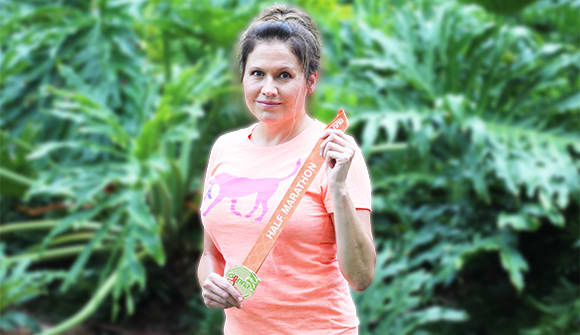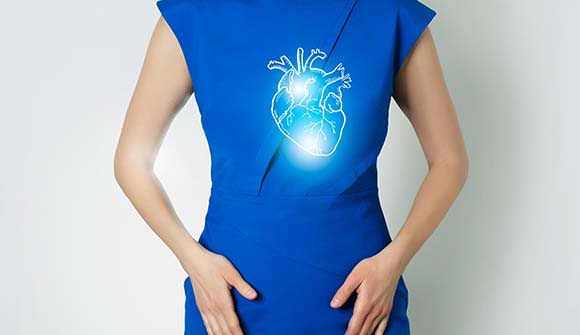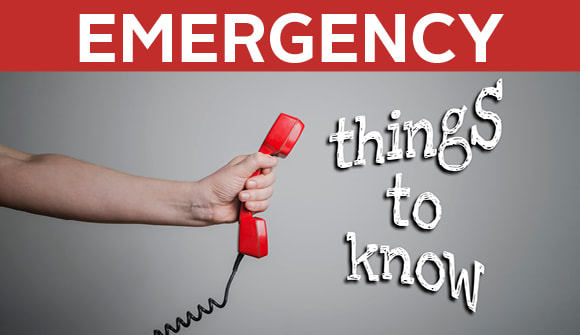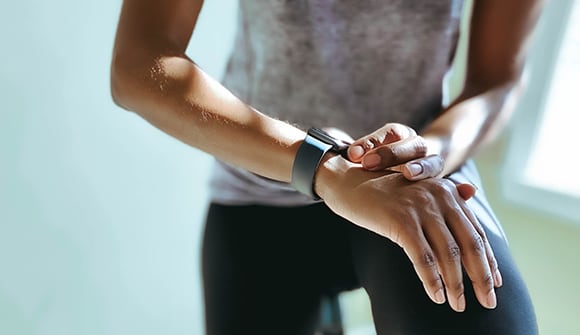Victoria is victorious
Five months. Two life-threatening health scares. One determined woman.
Article Author: Beth Stambaugh
Article Date:

When Victoria Cochran signed up for the Donna half-marathon days before her 50th birthday, she wasn’t worried about reaching the finish line. A veteran runner, she’d done many long-distance races before. But much bigger challenges lay ahead.
Just weeks after signing up for the annual race, which raises funds for breast cancer, Cochran was diagnosed with the disease. “I signed up in October – which happens to be Breast Cancer Awareness Month – for a race to beat breast cancer and then I find out I have it myself,” she said. Half a month later, her youngest sister was diagnosed as well.
In Cochran’s case, a screening mammogram showed suspicious calcium deposits, and a follow-up screening verified it was cancer. Two weeks later, she had surgery at Baptist MD Anderson Cancer Center to remove three lumps and a lymph node. After recovering from surgery, she began radiation treatment.
Most people wouldn’t consider running a half-marathon while undergoing radiation, but as race day neared, Cochran felt strong and wanted to run for herself and her sister. “I had recovered from my surgery and I was only two weeks into my treatment. I felt good about doing it.”
On race day – a gloomy, rainy Saturday in February, Cochran got ready for the run, wearing a T-shirt with her sister’s name printed on it, as many runners do to honor those fighting the disease or for those who have lost their battle.
Three miles from the finish line, her normal pace started to slow. Cochran has no memory of what happened, so her running partner and colleague filled her in. “I was very tired and told her I needed to sit down,” said Cochran.
Heart-stopping news
The next thing she knew, she was waking up at Baptist Medical Center Jacksonville a week later feeling very confused.
Cochran had gone into full cardiac arrest on the half-marathon course. “From what I was told, a number of runners stopped to help me. One of them began CPR.” When the EMTs arrived, Cochran’s heart had to be shocked to restore a normal rhythm and she was rushed to the hospital.
David Hassel, MD, a cardiologist with Baptist Heart Specialists, performed a heart catheterization to diagnose the condition and then did surgery to place a stent in Cochran’s heart to restore blood flow.
“Victoria’s condition is called spontaneous coronary artery dissection, or SCAD,” said Marc Litt, MD, one of Cochran’s cardiologists at Baptist Heart Specialists. “It happens when there is a tear in the lining of a blood vessel to the heart, creating a clot that prevents blood flow to the heart.
“SCAD is rare, and usually affects healthy, active women with no signs of heart disease, like Victoria,” Dr. Litt said. “Unlike most heart attacks, which are usually caused by atherosclerosis (plaque buildup in an artery), a person experiencing SCAD doesn’t have this.”
Dr. Litt doesn’t think running or breast cancer treatment caused the heart attack. “SCAD’s a spontaneous condition and the causes are still unknown,” he said.
Cochran wasn’t aware of any symptoms leading up to her cardiac arrest, but the signs are the same as those of a normal heart attack, which include:
- Uncomfortable pressure, squeezing, fullness or pain in davidthe center of your chest. It may last more than a few minutes, or goes away and comes back.
- Pain or discomfort in one or both arms, the back, neck, jaw or stomach.
- Shortness of breath with or without chest discomfort.
- Breaking out in a cold sweat, nausea or lightheadedness.
As with men, women’s most common heart attack symptom is chest pain or discomfort. But women are more likely to experience shortness of breath, nausea, vomiting, and back or jaw pain.
Being part of the solution
It is theorized that there may be a genetic component linked to SCAD. Cochran was referred to Vanderbilt University Medical Center for further evaluation, which confirmed the heart attack was caused by SCAD. Since then, Cochran has “signed over her DNA” to be part of both a Vanderbilt and Harvard University study to determine the causes of SCAD and if genetics play a role.
"I am hoping that over time, there will be a breakthrough. I am glad I can play a role in determining the cause of this rare condition,” Cochran said.
She is now a big believer in understanding your risk factors and family disease history. As a result, her family has had genetic testing to determine their cancer risk.
Now, cancer-free with a normally functioning heart, Cochran has been cleared to run up to three miles. She was able to return to work just two weeks after her heart attack and completed the remainder of her radiation treatments at Baptist MD Anderson Cancer Center.
Cochran reflects back on her experience and remarkable recovery to make sense of all she’s been through.
“There were so many odd coincidences,” she said. “Not only was I diagnosed with breast cancer during Breast Cancer Awareness Month, but I also had my heart attack in February, which is Heart Month. And my sister being diagnosed so soon after I was.” (Her sister’s prognosis is good.)
Having survived two life-threatening conditions has made Cochran pay special attention to what her life has in store and how she can give back. As a talent development professional, she wants to expand her reach in helping others to grow academically and professionally.
“Clearly, it wasn’t my time,” she said.
In addition to understanding your genetic history, Cochran stresses to others the importance of getting regular mammograms and taking care of yourself.
“I feel an immense amount of gratitude for my health care providers, my family, friends, colleagues, and the community. The outpouring of support was truly amazing. I received get-well cards from people I didn’t even know. It’s a constant reminder to me of how wonderful people are and how blessed I am.”
She’s also grateful that her heart attack happened during a race, where so many came to her aid and a runner was able to give her CPR.
Cochran was recently surprised by local celebrity Donna Deegan, founder of the Donna Run and three-time breast cancer survivor, who presented her with a commemorative finisher medal from the race.
The experience certainly hasn’t dampened her desire to continue reaching finish lines. “I plan to run the same race next year,” she said. “And reach the finish line.”
Primary care physicians are often the first to recognize changes that could lead to serious health conditions. If you are looking for a primary care physician, call 904-202-4YOU or click here.



